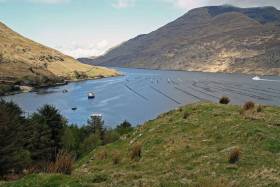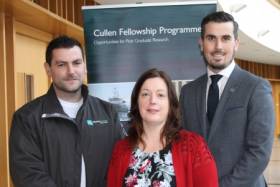Displaying items by tag: Cullen Fellowship
New Research On Improving Biotoxin Monitoring In Shellfish
A postgraduate researcher is investigating the biotoxin production potential of Azadinium and related species in Irish waters, particularly in estuaries used for shellfish aquaculture such as Killary Harbour and Bantry Bay.
Stephen McGirr — a PhD candidate at the Institute of Technology Sligo and a Cullen Fellow at the Marine Institute — is studying Azadinium, a planktonic single-celled plant that lives in marine waters around Ireland.
Under certain conditions, Azadinium produces biotoxins which can build up in shellfish that feed on them. If eaten by humans, this can lead to shellfish poisoning.
Understanding more about the biology of this species would help both the shellfish aquaculture industry and protect human health.
“The genus Azadinium was first linked to incidents of shellfish poisoning in the 1990s and both toxic and non-toxic forms of the Azadinium species have since been identified in Irish waters,” McGirr says.
“More knowledge of the biology of the species is needed to support monitoring efforts currently underway to assist the aquaculture industry.”
Ireland’s aquaculture industry employed 1,925 people on 288 aquaculture production units, according to Bord Iascaigh Mhara’s Business of Seafood Report 2018. In 2018 it is estimated that Ireland produced 24,200 tonnes of farmed shellfish valued at €56 million.
“Aquaculture is a valuable industry to our national economy as well as for many of Ireland's coastal communities,” McGirr adds.
“The closure of aquaculture production sites due to biotoxins produced by organisms such as Azadinium impacts the industry and can also be detrimental to local economies.”
Stephen’s research supports the Marine Institute's National Phytoplanton Monitoring Programme, which monitors phytoplankton populations and dynamics around the Irish coastline.
‘Aquaculture is a valuable industry to our national economy as well as for many of Ireland's coastal communities’
McGirr says the Marine Institute’s Cullen Fellowship Programme is giving him the opportunity to learn and develop his skillset, working alongside scientists who are experts in their field, as well as gaining hands-on experience using state-of-the art equipment in the Institute's laboratories.
“I have joined two surveys on the RV Celtic Voyager along the south and western coastline of Ireland to collect both water column and sediment samples for our analyses.
“I have also presented my research at international conferences, including the International Conference on Molluscan Shellfish Safety held in Galway and the International Conference on Harmful Algae, held in Nantes, France.”
McGirr is currently focusing his efforts on translating the product of his research into articles for peer-reviewed scientific journals. His research supervisors are Joe Silke, Marine Institute and Dr Nicolas Touzet, IT Sligo.
The Cullen Fellowship Programme builds marine research capacity and capability by equipping graduates with the skills and expertise in raising awareness about our ocean, as well as Ireland's rich marine biodiversity and ecosystems.
The programme has provided grant aid to the value of €2.06 million supporting 24 PhD and three MSc students over the last five years. The research addresses a number of the 15 research themes identified in the National Marine Research and Innovation Strategy 2017-2021.
This project (Grant-Aid Agreement No CF/15/01) is carried out with the support of the Marine Institute and funded under the Marine Research Programme by the Irish Government.
Importance Of ‘Blue Economy’ Skills Highlighted At Cullen Fellowship Meeting
Nineteen postgraduates presented their marine research highlighting the innovation and contributions being made towards the growth of the marine sector in Ireland at the Cullen Fellowship Programme’s two-day annual meeting last week.
Dr Peter Heffernan, chief executive of the Marine Institute which hosted the meeting in Oranmore, had particular praise for Philip Stephens of NUI Galway and James Fahy of University College Dublin, who recently completed their respective Master’s degrees in Science.
“The graduates and other Fellows’ high level of accomplishments are welcomed in Ireland, particularly when the ocean sector is one of the fastest areas of economic growth, outpacing progress in the general economy in recent years,” Dr Heffernan said.
The Cullen Fellowship Programme has provided grant aid to the value of €1.9 million supporting 24 PhD and three Master’s students in their research over the last four years.
This has involved 15 research themes identified in the National Marine Research & Innovation Strategy 2017-2021, ranging from marine technology and fisheries management to oceanographic research, aquaculture, fish health, food safety, seabed mapping, marine technology, shipping and maritime transport, marine environment, marine economics, law and policy, education and outreach.
“We are extremely pleased with the high calibre of skilled marine researchers that have been involved with the Cullen Fellowship in recent years,” said Martina Maloney of the Marine Institute’s research funding office.
“The opportunities that the students have gained has helped further support the Government’s national Harnessing Our Ocean Wealth strategy in developing a thriving maritime economy, building healthy marine ecosystems and creating engagement with the sea.”
The growth of Ireland’s ocean economy in 2017 had a direct impact of €5.5bn turnover employing over 32,000 people. The Government investment in the ocean economy is on track to double the value of Our Ocean Wealth to 2.4% of GDP by 2030.
“We are reliant on the ocean for its food through fisheries and aquaculture, ocean transport involving shipping and tourism as well as the societal impact the ocean provides us,” Dr Heffernan said.
“Therefore, with the trend in changing economies, new forms of energy, transport and food production transforming industries, companies and jobs in the near future, it is important that we continue to invest in third level research for our next generation of marine scientists and researchers.”
The Marine Institute set up the Cullen Fellowship programme in 2014 in memory of Anne Cullen (1958-2013), who had made a significant contribution to the work of the Marine Institute over 35 years, inspiring many students through the Institute's bursary programme, encouraging students to get hands-on experience to support their study.
The Cullen Fellowships are carried out with the support of the Marine Institute and funded under the Marine Research Programme by the Government.
Cullen Fellowship opportunities will be advertised as they arise on www.marine.ie under ‘Research and Funding – Current Funding Opportunities’ and through various social media channels.
































































